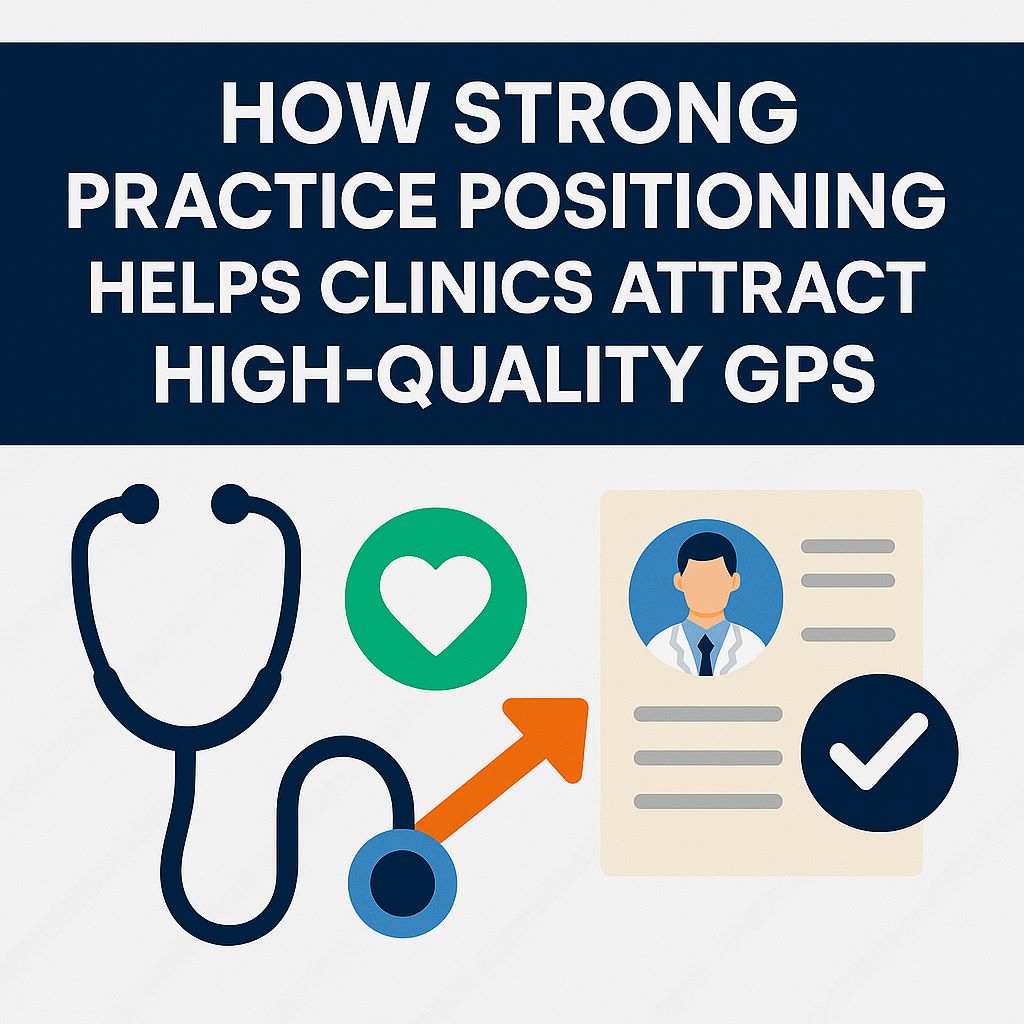Recruiting a General Practitioner in Australia has never been more competitive. With rising patient demand, DPA restrictions and limited GP availability, clinics often struggle to attract qualified doctors quickly.
While advertising and social media campaigns are important, recruitment companies have an additional advantage: their GP databases and professional networks. These curated lists of qualified, pre-screened doctors enable faster, higher-quality matches between clinics and candidates.
This article explores how GP networks operate, why they matter, and how clinics can benefit from working with recruitment firms that invest in maintaining them.
What Are GP Databases and Why Do They Matter?
A GP database is a confidential, continuously updated list of doctors across Australia. It includes VR, non-VR, IMG and locum GPs, along with their preferences for billing type, hours, location and special interests.
Recruitment companies use these databases to connect the right doctor to the right clinic without relying solely on public job boards.
As Wavelength Medical Recruitment describes:
“More than 3,000 General Practitioners in our database are ready to work.”
Similarly, Rural Workforce Agency Victoria (RWAV) notes:
“We source suitable GPs from our extensive database and shortlist candidates according to your key selection criteria.”
These examples highlight that scale alone is not the advantage. It is the quality, accuracy and curation of data that accelerate hiring outcomes.
How GP Networks Accelerate Recruitment
1. Immediate Access to Ready Candidates
Recruitment companies maintain constant communication with doctors who are actively or passively open to new roles. This enables clinics to bypass the waiting period typical of job boards and reach doctors who have already been verified and screened.
2. Matching Beyond Skills
Modern GP recruitment databases go beyond qualifications. They record detailed information about each doctor’s career goals, patient preferences, billing experience and family circumstances. This allows recruiters to recommend candidates who fit not just the role, but the clinic’s culture.
At Practice Boost’s GP Recruitment Company, our network includes VR, non-VR, IMG and locum doctors. Each candidate is evaluated on professional fit, communication style and long-term alignment with the practice’s values.
3. Saving Clinics Time and Cost
Recruitment firms can present interview-ready candidates in days rather than weeks. By pre-screening and verifying documentation, they reduce administrative burden and the risk of unqualified applicants.
4. Continuous Relationship Building
Because these networks are maintained year-round, not just when a vacancy arises, recruiters have ongoing insight into who is available, relocating, or finishing training. This real-time awareness helps clinics plan their workforce proactively.
The Difference Between a Database and a Genuine Network
Some clinics view “databases” as outdated spreadsheets. However, modern recruitment companies operate dynamic, CRM-driven platforms supported by relationship management.
A database is information. A network is connection.
Recruiters leverage both, using digital systems to store details and human relationships to engage and match doctors effectively.
JPS Medical Recruitment describes this dual system well:
“Our database of practices allows us to let you know about any General Practitioner job … we can advise whether the practice is bulk billing or mixed billing, and if we do not have it listed, we can find it for you.”
This shows how strong networks serve both sides of the equation: doctors and clinics.
How Clinics Benefit From Recruitment Company Networks
1. Faster Hiring for Urgent Vacancies
Whether a GP is leaving or expanding patient numbers require another doctor, networks provide instant access to pre-vetted candidates.
2. Access to Passive Doctors
Many GPs never browse job boards. Recruiters can reach out to these passive candidates directly through trusted relationships built over time.
3. Reduced Risk of Mismatch
Because recruiters track career goals, location preferences and billing experience, they can recommend candidates who are likely to stay long term.
4. Support for Regional and DPA Clinics
GP networks often include doctors open to relocation or international medical graduates seeking sponsorship. For rural practices, this can be the most effective way to find doctors willing to move.
Combining GP Networks With Digital Recruitment
The most successful recruitment firms combine traditional relationship management with modern digital tools.
For example, a campaign might begin with a Social Media Ad promoting an opportunity, which then drives interested doctors into the recruiter’s database. From there, targeted follow-ups through email and LinkedIn outreach convert warm leads into serious candidates.
This integrated approach connects advertising reach with the precision of curated data.
Real-World Example
A suburban Sydney clinic partnered with Practice Boost to fill two long-vacant GP roles. Instead of relying solely on job boards, the recruitment team activated its existing database of VR doctors. Within ten days, three qualified candidates were interviewed, and one was placed within three weeks.
The clinic saved more than a month of recruitment time compared with traditional advertising alone.
Best Practices for Clinics Partnering With Recruitment Companies
- Ask about network depth: Understand how many GPs are active in their database and how often it is updated.
- Clarify candidate verification: Ensure background checks and AHPRA verifications are current.
- Focus on fit, not volume: A curated shortlist of aligned candidates is more valuable than a list of unqualified CVs.
- Collaborate on messaging: Share details about your culture and patient base so recruiters can match effectively.
Common Questions Clinics Ask About GP Networks
Are recruitment company databases ethical and compliant?
Yes. Reputable agencies follow privacy laws and AHPRA guidelines, keeping all candidate information secure and confidential.
Do these networks include international doctors?
Yes. Many networks include IMGs with recognised qualifications who are eligible to work in Australia or ready for DPA sponsorship.
Can my clinic build its own GP database?
Yes, but it requires ongoing effort to maintain accurate information and nurture relationships. Partnering with a recruitment company offers immediate access to a broader pool.
How do GP networks compare with job boards?
Job boards reach active seekers. Networks reach both active and passive doctors, giving clinics access to candidates they would not otherwise meet.
Accelerating GP Recruitment Through Connection
In a market where demand outweighs supply, clinics cannot afford to rely on advertising alone. GP networks and databases give recruitment companies a head start by combining verified information with human connection.
For clinics, partnering with a recruitment firm that maintains an active, curated network means faster placements, better matches and longer-term success.
To explore how our database and digital recruitment model can support your practice, visit the GP Recruitment Company page or contact Practice Boost for a consultation.
%20(1).avif)
.avif)

.svg)
.svg)


.svg)

